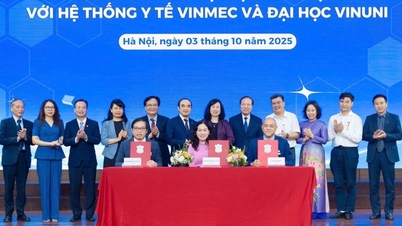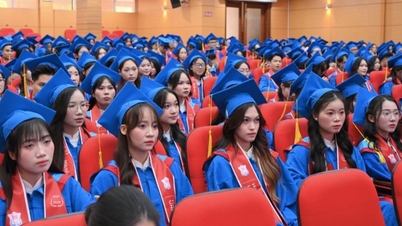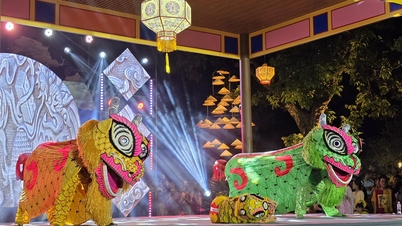Le Dai Minh surpassed more than 800 candidates to lead the residency exam of Hanoi Medical University thanks to a flexible knowledge accumulation strategy during 6 years of university.
In the residency exam of Hanoi Medical University at the end of August, Dai Minh (24 years old, Hanoi) scored 27.23/30 points. During the major registration session on September 9, Minh was the first to be called. Standing in front of teachers and friends, Minh loudly announced his chosen major: "Le Dai Minh, number 1, major in Anesthesia and Resuscitation".
Professor Nguyen Huu Tu, Principal of Hanoi Medical University, said that the residency exam has been held for 50 years and is the most intense and rigorous exam of the school to select outstanding students. The exam results determine how much or little power students have in choosing a major, so the competition is very high.
"Not only Hanoi medical students but also many excellent students from medical schools across the country take the exam with the desire to study residency here," said Professor Tu.
Minh also assessed this as the most rigorous exam of his student life with three subjects: major 1 (Internal Medicine and Pediatrics), major 2 (Surgery and Obstetrics) and basic subjects (Anatomy, Biochemistry, Physiology, Genetics). Each subject has about 120 multiple choice questions in 90 minutes, covering most of the knowledge of 6 years of university.
After receiving the scores, candidates are ranked from highest to lowest to choose their major. Observing every year, with 10 quotas, Anesthesia and Resuscitation - Minh's favorite major, was soon chosen by the top 50. Therefore, Minh initially set a goal of being in the top 40.
"I was surprised to get the highest score. There were many good students and I was not the best. The difference in knowledge was not much. I was just a little luckier," Minh said.

Le Dai Minh at Hanoi Medical University on September 12. Photo: Duong Tam
Minh is a former IT student of the High School for the Gifted in Natural Sciences , Hanoi National University. Although his parents wanted him to take the medical exam at the end of junior high school, Minh did not agree and instead planned to pursue Information Technology.
But after a semester of intensive IT study in grade 10, Minh found it unsuitable because he had to work with computers too much. After learning about other majors, Minh became excited about the medical field, realizing that "this field has many challenges, and allows him to grow in his relationships with patients and society."
In 2017, Minh passed the entrance exam to Hanoi Medical University with 29.55 points. That year, the school had a record high admission score of 29.25. It is very rare for a candidate in Hanoi to be admitted without priority points.
In the first year, Minh decided to take the residency exam after graduation, so he proactively accumulated knowledge and flexibly changed his study method each year.
In the first two years, Minh studied carefully, mostly only in the lecture hall, referring to domestic and foreign documents, in addition to the school's textbooks. Reading documents started with "classics" such as Gray's Anatomy , Guyton or Robbins' Pathophysiology .
Even with an IELTS score of 8.0, reading books in English is not easy because there are many technical terms. Minh reads and looks up the dictionary to accumulate vocabulary, and joins an English club to have an environment to practice reading.
From the third year, entering the stage of both studying at school and doing clinical work at the hospital, Minh changed the way he accumulated knowledge because the time at the hospital was mainly spent, learning revolved around patients more than documents.
In each clinical session, after receiving instructions from teachers, Minh sets specific goals. For example, when studying respiratory medicine, the goal is to differentiate syndromes, Minh will contact many patients or look for people with syndromes similar to the cases given by teachers.
Then, Minh asked himself questions and searched for answers by researching. If he couldn't find the answers, Minh asked the lecturer.
"Teachers play a very important role because there are things that are not available online or I don't know how to look them up," Minh said.
For the Hanoian, clinical practice is a particularly effective way to learn. Minh remembers most the 10-week period of studying Surgery at Viet Duc Hospital in his fourth year. At that time, many serious cases such as traumatic brain injury and circulatory arrest were transferred continuously, forcing Minh to get used to many things at the same time.
On his first day on duty, Minh assisted in a surgery involving a femoral artery injury, which posed a risk of amputating a lower limb. The first time he assisted in a surgery that lasted 5-6 hours, Minh was very nervous even though he didn’t do much. At the end of that session, Minh felt both confident and self-conscious.
"I'm confident because I feel I have enough stamina to pursue this career, but I'm also self-conscious because I realize my knowledge is too limited," Minh shared.

Minh (third from left) and two candidates with the highest scores in the residency exam were honored on September 9. Photo: Hanoi Medical University
From the fifth year, the study intensity increased sharply and became really stressful, according to Minh. At that time, students changed majors every 2-3 weeks. There was a period when exams were held for one subject every 1-2 weeks, forcing students to concentrate highly. This was also the period that helped Minh get used to the pressure of exams.
Entering his senior year, the study intensity continued to increase as his residency exams approached. Minh described a day as "studying from the moment he woke up until he went to bed." He had to balance it by taking "day offs" to relax, play basketball, or listen to music.
Dr. Nguyen Toan Thang, Deputy Head of the Department of Anesthesia and Resuscitation at Hanoi Medical University, Chairman of Minh's graduation thesis evaluation board, assessed Minh as having the ability to balance, withstand pressure well, be meticulous, love to learn and love to read.
"He has outstanding abilities, especially in foreign languages and scientific research," said Dr. Thang. According to information from the school, Minh has participated in scientific research since his third year, formed his own research group and had 5 articles published in international journals.
Repeating the word "accumulate" many times, Minh said that doing anything requires this. In the future, Minh will also try to accumulate knowledge, see where he is weak and spend more time improving.
"Six years of studying medicine is very long but probably the most relaxing. In the next three years, I will have to learn a lot because when entering the profession, I am no different from a blank sheet of paper," Minh said.
Choosing Anesthesia and Resuscitation because he believes it is the intersection of many specialties such as Internal Medicine, Surgery, clinical fields and basic sciences, Minh hopes to grasp a lot of knowledge and skills during his residency to prepare for his future job.
Vnexpress.net








































































































Comment (0)